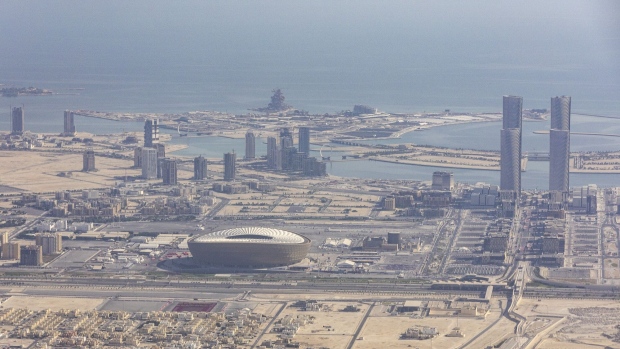Jun 7, 2023
FIFA Can’t Call 2022 World Cup Carbon-Neutral, Regulator Rules
, Bloomberg News

(Bloomberg) -- Almost six months after Qatar hosted what it billed as a “carbon-neutral” World Cup, Switzerland’s advertising regulator ruled that FIFA, the world’s governing body for football, can’t repeat the tournament’s dubious climate claims.
The Swiss Commission for Fairness said today that FIFA was wrong to say in its marketing that the event, held in Qatar in November and December of last year, was “fully carbon neutral.” The ruling followed an investigation spurred by complaints from climate groups in five European countries that FIFA’s environmental claims had not been verified.
“At the time of communication, claims of this nature could only be made if the body could — using generally accepted methods — fully substantiate the calculation of all [carbon dioxide] emissions caused due to the tournament and provide proof that these CO2 emissions have been fully offset,” the Commission said in a press release.
According to greenhouse gas accounting released by the World Cup’s organizers — a triumvirate made up of FIFA, the World Cup Qatar 2022 LLC (Q22), and the Supreme Committee for Delivery & Legacy (SC) — the event was expected to generate 3.63 million metric tons of CO2, which the group planned to offset using carbon credits. Independent researchers described that figure as too low.
Read More: Qatar’s Carbon-Neutral World Cup Is a Fantasy
In its findings, the Swiss Commission said FIFA failed to provide sufficient evidence of its emissions estimate or offsets plan. The CO2 calculation rested on the assumption, for example, that stadiums specifically built for the Qatar World Cup would be reused for the next 60 years, a premise that watchdog group Carbon Market Watch called “extremely unlikely.” The carbon-neutrality claim also relied on offsets that may not align with Swiss standards, the regulator noted, which require “a complete and permanent removal of CO2 from the atmosphere.”
The Commission concluded its findings with a recommendation that FIFA “refrain from making unsubstantiated claims in the future.”
In an emailed statement, a FIFA spokesperson said it is “fully aware of the impacts that mega-events have on the economy, the natural environment and on people and communities, and has been making substantial efforts to tackle those impacts.” The organization left open the possibility of appealing the Commission’s recommendation.
Climate advocates said the ruling should force FIFA to be more careful in the future. “This is a very important decision,” said Frank Huisingh of Fossil Free Football, which submitted a complaint in the Netherlands. “The next step is a serious plan to reduce the emissions of its tournaments.” Huisingh suggests focusing on locations with existing infrastructure and low-carbon transportation options, and selling more tickets to locals.
©2023 Bloomberg L.P.





